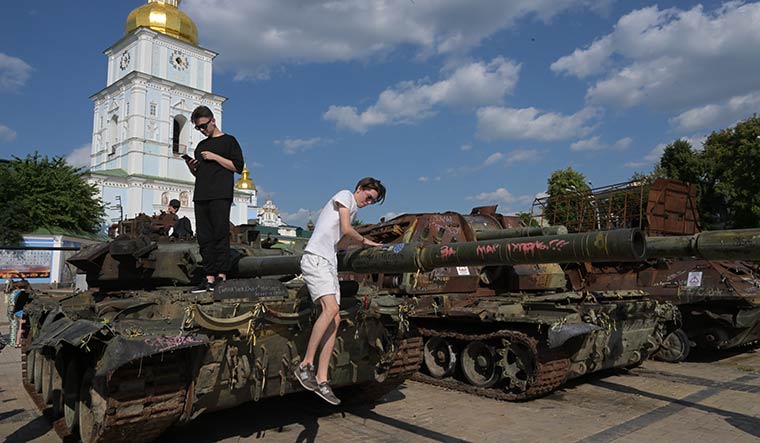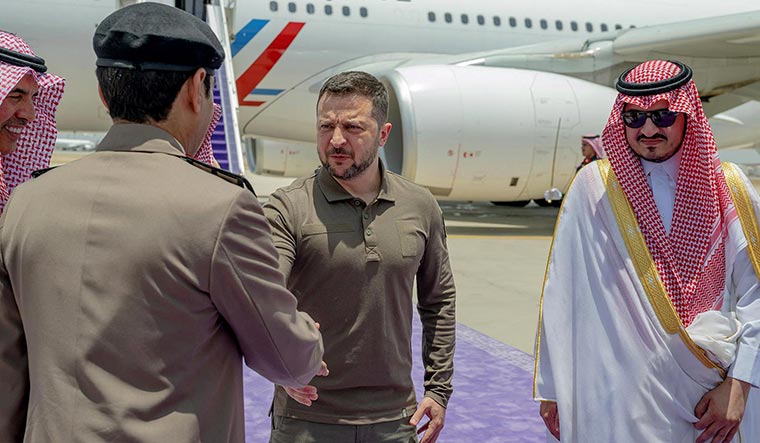THERE IS A RAGING debate whether the August 5-6 meeting of national security advisers and top security and foreign policy officials from several countries to discuss a peaceful regulation of the war in Ukraine can be called a peace summit at all, because one of the parties in the war was not present. Russia was not included, and it called the summit “a doomed attempt to woo the global south”.
Nevertheless, representatives of the 42 countries which gathered in Jeddah discussed peace and only peace, neither military aspects of the war, nor supply of weapons, or sanctions. Prospects of Russia and its problems were not discussed. The discussion was creative, constructive and consensus-oriented around Ukraine, as mentioned by the Ukrainians.
The Ukrainian delegation in Jeddah was led by Andriy Yermak, presidential adviser and head of the president’s office. The delegation included, among others, two deputy heads of office, senior diplomats Andriy Sibyha and Ihor Zhovkva as well as Deputy Minister of Foreign Affairs, Mykola Tochytskiy.
There are important takeaways from the meeting, a smooth shift towards the positive since the June 24 meeting in Copenhagen. Although the attempts are nascent, gradually, Ukraine shapes the peace it wants, somewhat similar to its careful and steady military counteroffensive regaining occupied territories.
The basis of discussion in Jeddah remained unchanged―it is the 10-point peace formula presented by President Volodymyr Zelensky at the G20 Summit in 2022 in Bali. That, perhaps, is the first and most important point. All other peace proposals, track 1.5 or track 2 initiatives, advanced by other states or groups, therefore, have to fit into this Ukrainian peace formula. Jeddah proved that Copenhagen could not be nipped in the bud.
The second significant takeaway is that all participating countries without exception spoke in favour of honouring the UN Charter, the territorial integrity and sovereignty of states. This includes four of the BRICS nations―Brazil, China, India, and South Africa―as well as many other states of Asia, Africa and Latin America. India was represented by National Security Adviser Ajit Doval. Notably, the level was higher than in Copenhagen, where Sanjay Verma, secretary (west) of the ministry of external affairs took part.
In spite of the fact that many countries are yet to openly condemn Russian aggression and the invasion of Ukraine, all agreed to the withdrawal of Russian forces from the territory of Ukraine and restoration of its internationally recognised borders. This is what the Ukrainians say about the Jeddah summit being a “huge blow to Russia”. Russian plans for peace negotiations, acknowledging the annexed territories, with the Kremlin reiterating that Russia will “keep those regions, which have been included into the constitution of Russia”, thus become a non-starter. Any idea of annexation, or frozen conflict, is overruled.
The summit’s success is also due to the fact that the philosophy behind the 10-point peace formula champions the cause of global multilateralism, with abundant references to UN resolutions and documents. It starts with issues that affect all countries, all aspects of life, civil or military, and also those issues that are beyond dispute and disagreement―radiation and nuclear safety and food security. Then comes energy security, an important component of climate change, also a global issue.
 Spirit of resilience: Children playing with captured Russian armoured vehicles displayed in front of St. Michael’s Golden-Domed Monastery in Kyiv | Bhanu Prakash Chandra
Spirit of resilience: Children playing with captured Russian armoured vehicles displayed in front of St. Michael’s Golden-Domed Monastery in Kyiv | Bhanu Prakash Chandra
Moving from the generic to specific, from the fourth to tenth points, we can read about the release of prisoners and deported persons, restoration of territorial integrity, withdrawal of Russian troops and cessation of hostilities, accountability and restoration of justice, including reparation, ecological safety. The ninth and tenth points deal with preventing escalation and repetition of aggression and confirmation of the end of war by a peace conference and signing of an international agreement.
The steps ahead will be on a three-level format: apart from communication at the NSA level, meetings at the ambassadorial level will be held in Kyiv in the parliament within a month or two, where almost 60 ambassadors are expected to take part. Improving the peace formula, not changing it, is the ultimate aim, enriching it with inputs from various countries. The third and highest level will be the convening of a summit on the heads of state level. The agenda for the summit and a possible document to be adopted are being agreed upon now.
Working groups on each of the 10 points of the peace plan, to be chaired or co-chaired by interested countries, is also another dimension of the work. Specific countries were not mentioned, although these issues were the focus of more than 30 bilateral meetings that the Ukrainian delegation had in two days in Jeddah. On the table of such meetings are the bilateral security guarantee treaties that Ukraine wants to conclude, contours of which are yet to be defined. In Yermak’s words, “such security guarantees are like anti air missile defense systems against future world wars”.
Vague and ambiguous as it may seem, the Jeddah summit did not produce any concluding document. Many countries also prefer to be observers and not be bound by obligations. However, in reality, adopting a document just for the sake of it yields no result. In that sense the absence of a document at this stage provides all nations with the maximum level of flexibility and diplomatic leverage to act in their national interest in the future. Who does not know, absence of official documents or use of non-papers are sometimes more important in diplomacy.
Russian aggression has run into the national interests of many countries and has hit hard their national pride. Recently, the world saw how the offer of free grains to African nations by President Vladimir Putin during the Russia-Africa Summit in St. Petersburg, was politely rejected by South African President Cyril Ramaphosa. African nations are wary of the presence of Wagner mercenaries, and the strings of instability of coups on the continent. Smaller states are worried about being annexed by more powerful states.
Unprecedented diplomatic intensity in all capitals and heightened realisation by all nations of the need for protecting the fundamental principles of interdependence and peaceful coexistence are the results reinforced by Jeddah, which, by the way, is a twin city of Ukraine’s Odessa, where port infrastructure was badly hit by Russian missiles. Yermak remarked that the summit in Jeddah will enter history as a “rehearsal of a future world, which has no place for stone-age aggression”.



